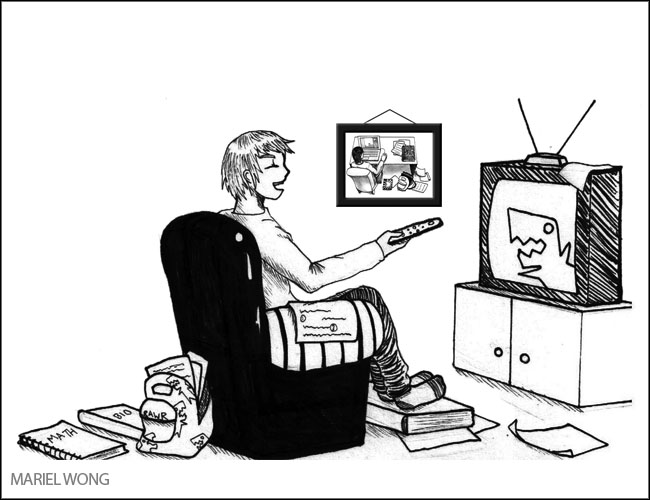
Teenagers are procrastinators. In an era where media and technology make escaping to a virtual world as easy as clicking a button, many people have a difficult time confronting the tasks awaiting them in the real world.
“I can never find the urge to do homework in the first place,” says sophomore Austin Lee. “I get really lazy and I don’t feel like doing my homework sometimes because I’m watching T.V. or something.”
The electronic media also serves as an easy outlet for teenagers to turn to when their minds are simply too tired to process new material.
Sophomore Rebecca Zipkin says, “Because I’m usually tired, I never want to think about the fact that I have a lot of work to do so I put everything off because I’m tired and want to sit down for a few minutes and have a snack and waste time on the internet.”
The Internet offers infinite links to satisfy any kind of interest, which is more attractive to many teenagers than the monotony of homework or studying.
“It’s more entertaining and there’s more stuff to do [on the computer]. Homework every single night gets boring, but when you talk to your friend on Facebook it’s different each time,” says sophomore Jon Howard.
Lee adds, “I’m not motivated [to do homework] because it isn’t really something interesting to do. Maybe if the homework assignment was an interesting subject like drawing then I wouldn’t procrastinate.”
Sophomore Arash Jalali-Sohi backs up Lee’s theory on homework and says, “Because I find my Chemistry and History class really interesting, it’s easy for me to complete those assignments without being sidetracked.”
Yet another trigger of procrastination is the fact that the reward for the hard work put into an assignment is neither immediate nor guaranteed. Human motivation is heavily influenced by expectations of how imminent the reward is perceived to be, as shown by the studies of Daniel Kahneman, a notable scientist who was awarded the 2002 Nobel Memorial Prize in Economics for his collection of work on the prospect theory. The theory describes how people choose between probabilistic alternatives and evaluate potential losses and gains.
“There’s no motivation to do homework if it’s due way ahead in time,” says Junior David Koshy. “If you do the work and then don’t turn it in the next day, then you come to school feeling like you had wasted your time.”
Koshy’s and many other teenagers’ attitude towards homework support the basics of Kahneman’s prospect theory. Even though working ahead of time will alleviate stress in the long run, the eagerness to get an immediate satisfaction sometimes supersedes peoples’ rationality. Thus, watching a favorite television program appears to be more advantageous than working on homework due later because the satisfaction is immediate.
Howard adds, “That’s why I like some teachers that collect homework the day that it’s due instead of the teachers that sign off for it and collect it in two weeks, because then you feel like you actually got a grade for it.”
On the other hand, some people have figured out their own methods to avoid procrastination.
“I would recommend that students cut out time earlier in the weekend to do their homework because I do all my weekend homework on Saturdays so that I can have Sundays free to do what I want. [This] makes my weekend a lot less stressful,” Zipkin says.
Similarly, Jalali-Sohi says, “Depending on how many days I have, I usually split up my work into even amounts of time. But I make sure—depending on how hard an assignment is—to start one night and finish it on another.”
Although procrastination is hard to avoid, it does not stem completely from laziness. There are many legitimate reasons for procrastination, and one must find his or her own way to avoid the distractions.





